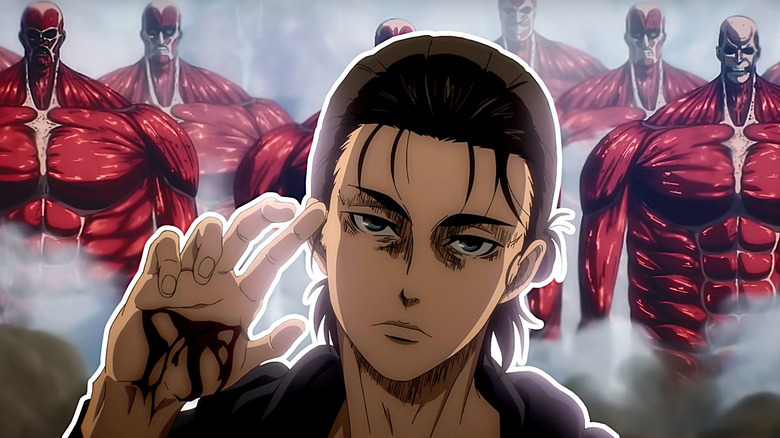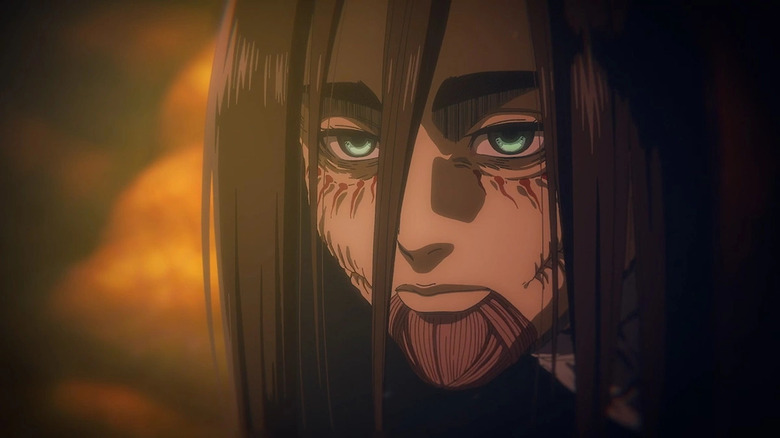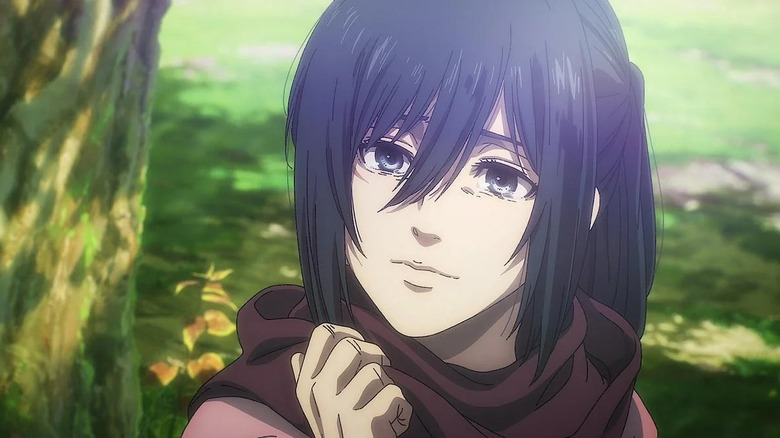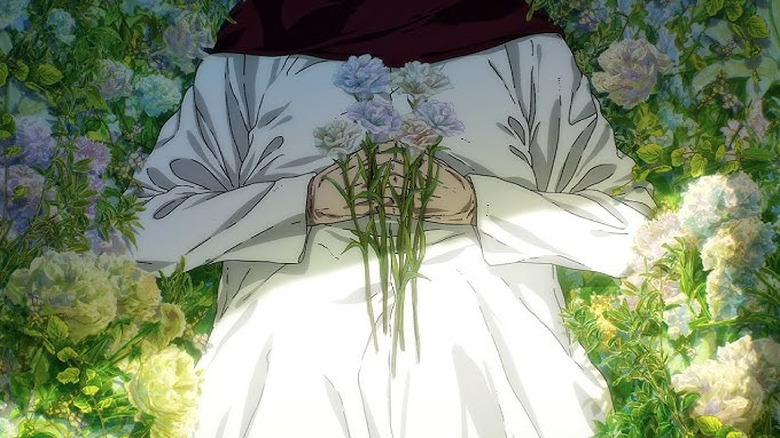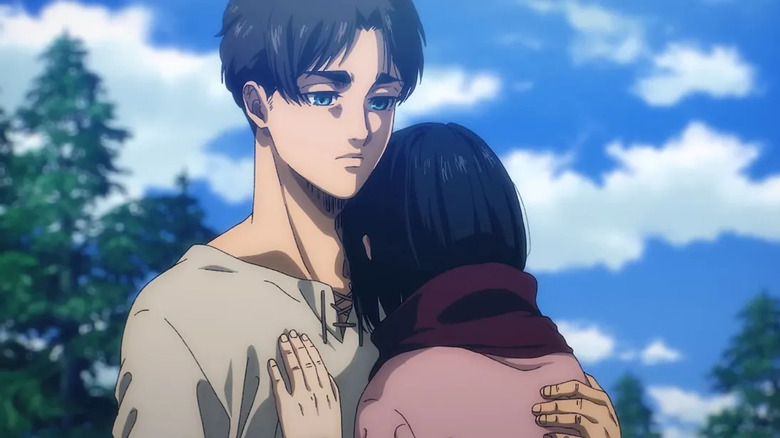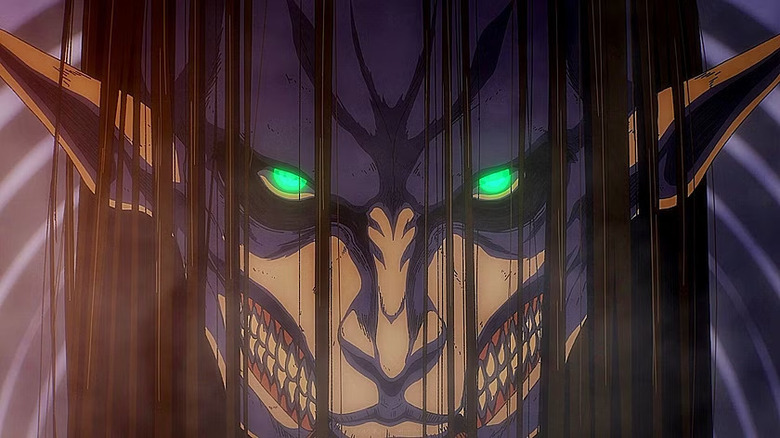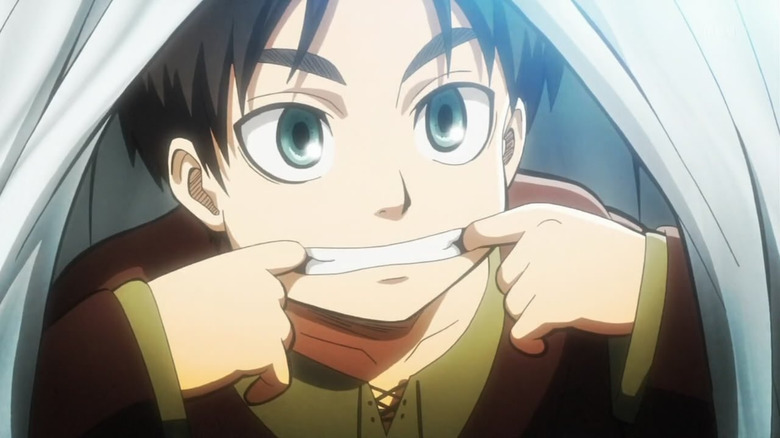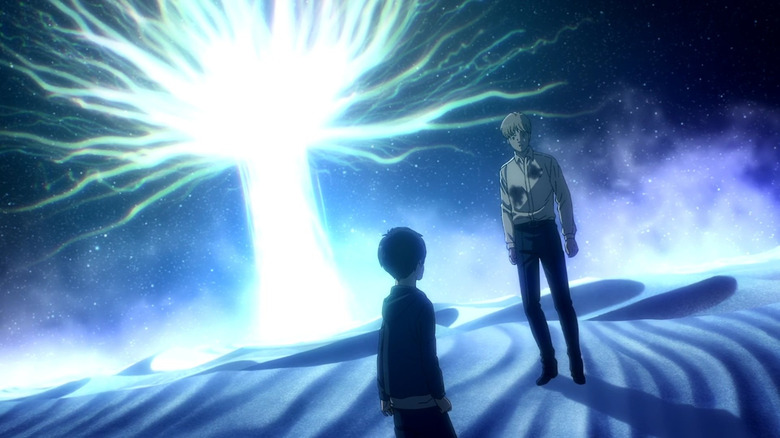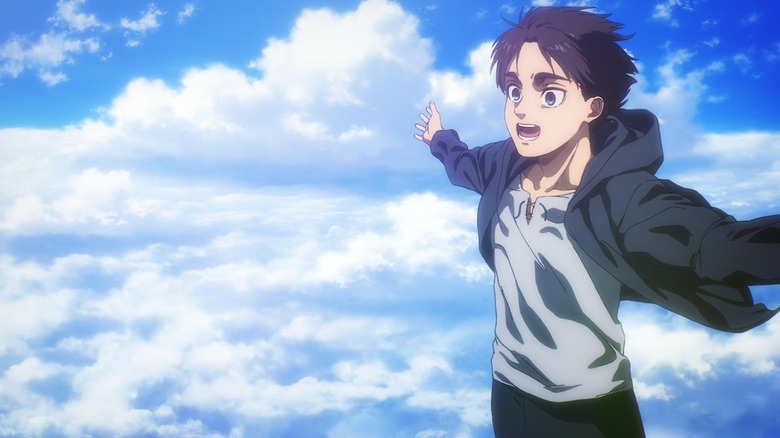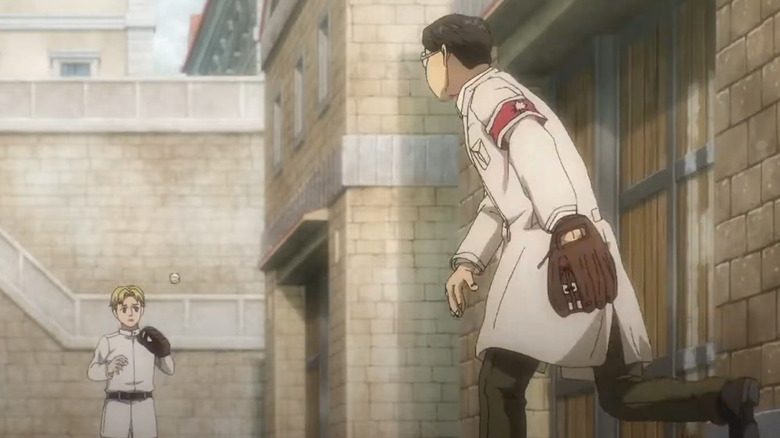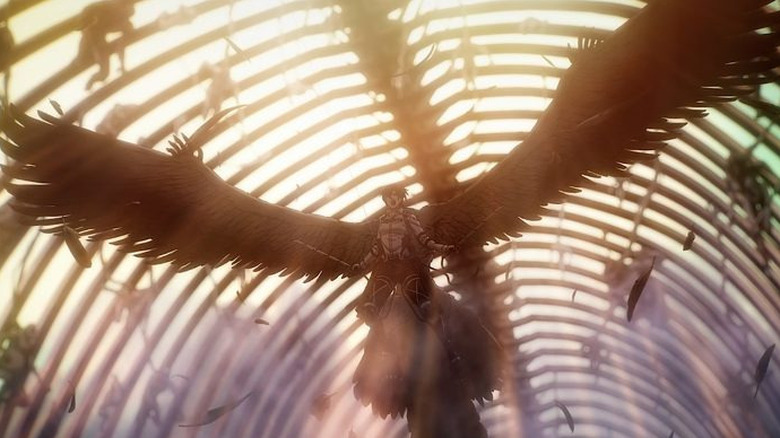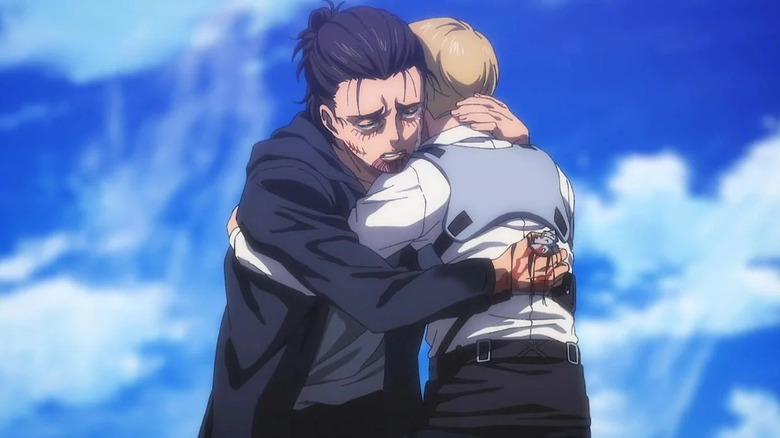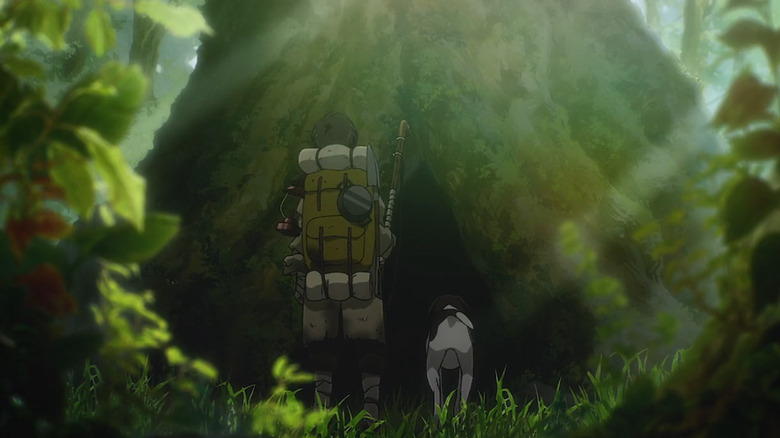The Ending Of Attack On Titan Season 4 Part 3 Explained
It's the end of an era. After a 10-year run from 2013 to 2023, "Attack on Titan" has come to a bittersweet end, leaving a void in viewers' hearts and an indelible impact on anime as a whole. Not only is "Attack on Titan" one of the most popular anime series in Japan, but it has also become one of the most popular anime series in the entire world, helping establish anime into mainstream culture on a new level.
The series finale has been a long time coming. The first three seasons of the show were produced by Wit Studio and released over the course of six years. While this is no short stretch of time, it helps put into perspective why fans were so shocked that the fourth season alone took three years for MAPPA studio to produce.
The finale itself is broken into two parts, and the conclusion proved to be a roller coaster of emotions for viewers all over the world, filled with epic fight scenes, heart-wrenching goodbyes, and one plot twist after another. There's a lot to take in, so let's break down everything that happens in the final episode, including the atrocities Eren commits, what that means on a deeper level, and how the ending sets up the possibility of a sequel.
What you need to remember about the plot
The episode starts off with an epic battle to defeat Eren and stop the Rumbling, which is later known as "The Battle of Heaven and Earth." The survivors land on Eren's enormous back and Armin is quickly taken by an Okapi-like Titan. As the others try rescuing him, they clash against former Titan Shifters summoned by Eren that overpower and nearly defeat them. The tide turns when we find out that during this time, Armin's consciousness was in the Paths realm with Zeke, where they convinced former Titan wielders to fight against Eren. With their help, the group rescues Armin; Jean detonates dynamite wrapped around Eren's neck and blows his head off, and then Armin sets off a massive explosion with his Colossal Titan transformation.
The Shining Centipede, the source of the Titans, attempts to reconnect with Eren, who has transformed into a new Titan form. The Marleyans try to help the survivors slay the Shining Centipede, which turns all the nearby Eldians into pure Titans, while Armin engages Eren in battle. As Levi and Mikasa rush towards Eren, she's suddenly transported to the Paths, where she's living a peaceful life with Eren in an alternate timeline. Upon returning to the real world, she finds Eren's true body inside his Titan form and cuts his head off. The Founder Ymir watches as Mikasa holds Eren's decapitated head and gives him a kiss.
What happens at the end of Attack on Titan?
After Eren is defeated, we find out he had spoken to many characters in the Paths, but memories of those conversations are only restored upon his death. He explained to Armin that he set off the Rumbling to become such a hated enemy that his friends would become international heroes upon killing him, which would free all Eldians from oppression. We also learn that Ymir loved King Fritz, despite being horribly mistreated by him, so she continued carrying out his will for 2,000 years. She longed to be free from this agonizing love, so she agreed to help Eren carry out the Rumbling if Mikasa was the one to kill him, freeing herself from loving Eren to a certain extent.
Back in real life, all Titans have been eradicated from the world, so the Titan wielders don't have their powers anymore, and those who became pure Titans earlier are back to normal. Mikasa takes Eren's head to Paradis for a proper burial as other members of the Scout Regiment see the spirits of their fallen comrades.
Three years after Eren destroys 80% of humanity with the Rumbling, the world is beginning to heal, but now the Yeagerists on Paradis Island are preparing to retaliate against those who killed Eren. Armin and a handful of survivors are on their way to meet with them and discuss peace. Meanwhile, Mikasa sits next to Eren's grave, located in Paradis under the tree where he used to nap as a child. She talks to him, then a bird tugs at her scarf and flies away, and she tearfully thanks Eren for wrapping her scarf around her.
The cycle of violence continues
The episode ends on a fairly happy note by "Attack on Titan" standards, but the post-credits scene changes everything. As the years go by, Mikasa continues visiting Eren's grave and eventually she's accompanied by what appears to be her husband and their child. We then see that Mikasa grows old and passes away, buried with the red scarf and the flowers that were on Eren's grave.
Time keeps racing by, and as the tree grows, so does the city behind it. We see cars and airplanes zoom by; skyscrapers climb higher into the sky, and eventually the city is ravaged by war. Missiles destroy the city and nature reclaims the area, with the tree towering over the landscape. A boy and a dog explore the area and notice the tree. He's wearing a scarf similar to Mikasa's, suggesting that he's her descendant, and starts approaching a hole in the base of the tree. The scene is remarkably similar to when the Founder Ymir found the power of the Titans, implying that history repeats itself.
All of the war and destruction in the post-credits scene suggests that violence is part of the human condition — it was never connected to specifics like Titans or racism against Eldians. Despite Eren's attempt to level the world and create a future where everyone is united, people continue finding reasons to fight against one another.
The enduring power of love
The series finale is just as amazing as it is tragic, showing us that love is one of the most powerful and enduring forces in the world. Mikasa has to kill Eren for humanity's sake, which naturally forces her to live her life without him, but it's clear that she never stops caring for him. Even as the decades pass, she continues visiting his grave and wearing the scarf he gave her.
Ymir's love for King Fritz endures even longer than that. She continues loving him for 2,000 years, even though she yearns to be free from this love that keeps her imprisoned and enslaved. We can even see that Armin's love for Eren as a friend endures against all odds. When they speak in the Paths, they vow to reunite in Hell after the Rumbling, and upon seeing Eren's decapitated head in the real world, Armin bursts into tears. Despite the atrocities that were committed, all the ways these characters have hurt one another, and all the time that passes, their love for one another remains as strong as ever.
Who is the real villain?
If you ask an "Attack on Titan" fan who the real villain is, you could get any number of answers. Eren is the obvious choice since he destroys 80% of humanity. But The Marleyans could be seen as the real villains since their oppression and mistreatment of the Eldians is what leads Eren to set off the Rumbling in the first place. Maybe the real villain is something much more abstract, like the destructive nature of human beings that causes us to keep waging war against one another throughout the ages.
Each viewer can decide for themselves who the real villain is in "Attack on Titan," but the finale suggests there isn't a cut and dry answer. Whether it's the Marleyans, Eldians, or the Yeagerists, each group thinks they're right and is willing to fight to the death for their beliefs. The post-credits scene that shows the cycle of war and violence continuing endlessly implies there is no objective right or wrong, and no objective good or evil. Instead, it suggests that morality is subjective since war wouldn't exist if everyone agreed with each other's views.
The inevitable loss of innocence
When they were kids, Eren, Mikasa, and Armin were so carefree; they spent their days playing and dreaming about all the amazing things the future had in store. Later, when they join the Scout Regiment, they still have a spark in their eyes and believe they can make the world a better place. Compare that to the way they are in Season 4 and things quickly get depressing — the trauma and hardship they endure strips away their innocence.
The final episode suggests this loss of innocence is inevitable. Near the end of the episode, three children that resemble Eren, Armin, and Mikasa are playing together. Since the post-credits scene reveals that war continues to be waged without Titans on Earth, we can assume that these children and ones like them are affected by it. Just like Eren, Mikasa, and Armin, their innocence will be lost over time as they learn the harsh reality of life. Gabi and Falco demonstrate this theme as well — they're both children but take part in the Battle of Heaven and Earth and see countless acts of violence.
We are all connected
The Paths are the clearest way the series finale shows how people are connected. All Eldians are connected through the Paths — the invisible ties between them and the Founding Titan. This allows Eren to communicate with them no matter how far apart they are, and at the end of the episode, we learn that he used the Paths to communicate with nearly all the main characters before the epic battle. He can see the ways people are connected better than anyone since he has the ability to see the past, present, and future all at once, and understands how everyone's actions have affected or will affect one another.
Beyond that, the finale shows that everyone in the world is connected to each other. They're all universally affected by the Rumbling, and after the majority of humanity is decimated by it, they have to work together to rebuild what's left of civilization. And unfortunately, as the post-credits scene reveals, their connections to one another eventually lead to more conflict and widespread destruction.
What is true freedom?
Since the very first episode, freedom has been a major theme of "Attack on Titan." Eren and the others initially thought they would be free once they eliminated all the Titans and could safely go outside the walls where they could travel to see the ocean and other breathtaking sights across the world. The idea of freedom stays relevant between then and the series finale, but Eren and the others have had to figure out what freedom really means.
By this point, Titans are no longer the enemies and those from Paradis have traveled far beyond the ocean. Freedom is no longer just the ability to go where they want but being able to do so without fear and oppression. One of the main reasons Eren incites the Rumbling is to free the Eldians from the years of oppression they've experienced at the hands of the Marleyans.
However, Eren has to sacrifice his own freedom to make this happen. He is trapped by his own destiny and unable to do what he really wants, which is to live out the remainder of his life with Mikasa. When she kills him, it sets him free in a way, and we can see this symbolized through birds and flight. Years later when Mikasa visits Eren's grave and says she wants to see him again, a bird nips at her scarf and then flies away, implying this is Eren, who is finally free.
Seemingly insignificant moments matter the most
When Zeke and Armin meet in the Paths realm, they discuss the meaning of life, with Zeke saying that the point of life is to multiply. As they continue talking, Armin mentions some moments in life that have stuck out to him: racing Eren and Mikasa up a hill, reading inside on a rainy day, and feeding acorns to a squirrel. Although these moments seemed insignificant at the time and have nothing to do with multiplying, they're extremely precious to him. Zeke suddenly recalls playing catch with the father figure in his life and tells Armin that he could've been happy throwing that ball back and forth forever.
The moments that mattered most to them aren't massive milestones like when they joined the military or inherited their Titan powers. Instead, they are simple moments shared with the ones they love. The time they spent enjoying the present moment with people they cared about are the memories they remember most fondly, making these seemingly insignificant moments the most meaningful of all.
Keep fighting for what matters
The survivors never give up while fighting to save humanity, even in the face of defeat. During the Battle of Heaven and Earth, the former Titan Shifters are overpowering them, and Reiner asks Jean if he still thinks they can win. Jean replies, "Nope. But let's at least keep fighting all the way to the end. We're Scout Regiment. Scouts don't know when to quit."
This sentiment continues throughout the finale. Despite Armin getting held hostage, the Shining Centipede turning Eldians into pure Titans, and Levi sustaining a life-threatening injury, giving up is never an option. Like they've done throughout the series, the Scouts keep fighting for what matters most to them, holding onto a tiny shred of hope while facing an overwhelmingly bleak situation. They have to make some extremely difficult choices to save humanity — Mikasa beheading the person she loves the most, for instance — but their sacrifices and determination are worth it in the end.
Hajime Isayama always planned for the story to end this way
Hajime Isayama, who wrote and illustrated the manga, envisioned the tragic ending of "Attack on Titan" from the very start. He wanted the story to focus on a main character who begins as the victim, then becomes the attacker. Certain parts of the story changed along the way, but the conclusion pretty much stayed the same. Even though things ended on a much darker note than most mainstream stories tend to, breaking viewers' hearts around the world, Isayama felt it was the right choice.
"I guess there could have been an ending where it was a happy ending, and the war ended, and everything was fine and dandy. I guess that could have been possible," he told The New York Times. "At the same time, the end of fighting and the end of contention itself kind of seems hokey. It kind of seems like it's not even believable. It's just not plausible in the world we're living in right now. And so, sadly, I had to give up on that kind of happy ending."
There's a possibility of a sequel ... in theory
While the main storyline of "Attack on Titan" is all wrapped up, the post-credits scene suggests the possibility of a sequel. A boy who is assumed to be Mikasa's descendant approaches a hole near the base of the gigantic tree that Eren is buried under. The scene closely resembles the moment the Founder Ymir approaches a large tree and comes in contact with the source of the Titans, becoming the first Titan wielder. Since Eren's remains are underneath the tree the boy discovers, it's plausible that he could become the next Titan wielder, bringing Titans back to Earth and setting the cycle in motion again.
However, as of November 2023, there are no plans for a sequel. Back when Isayama was writing the manga, he talked about what he plans to do after the series ends. "Once 'Attack on Titan' is over, and I successfully hurt everyone, I dream of opening a spa with the tears and sweat of my readers." (via @ustadlevi / X) We're sure more than enough fans cried during the series finale to make that happen, but only time will tell if a sequel comes to fruition. Until then, re-watching the anime will have to do. See you later, Eren.
